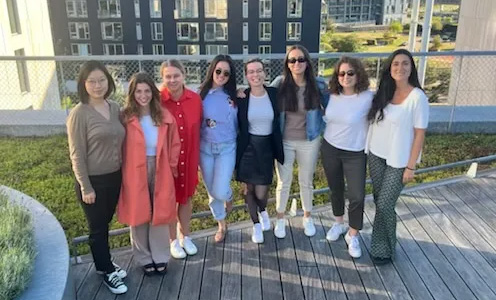SAPIENS Network Legal Bootcamp
 On 29th-30th August 2022, CEPRI (Center for Private Governance) hosted SAPIENS Network’s Legal Bootcamp at the Faculty of Law at the University of Copenhagen. The event goal was, as the name Boot Camp suggests, to provide a short, intensive, and rigorous course of training on PhD legal research.
On 29th-30th August 2022, CEPRI (Center for Private Governance) hosted SAPIENS Network’s Legal Bootcamp at the Faculty of Law at the University of Copenhagen. The event goal was, as the name Boot Camp suggests, to provide a short, intensive, and rigorous course of training on PhD legal research.
SAPIENS Network’s ESRs (PhDs) who write their thesis in law were asked to first submit in a written form draft of their 1st chapter as well as a summary of the conducted literature review on their topics. Each ESR received written feedback from two senior legal scholars from the University of Copenhagen. Based on the submitted material, each ESR presented for 45 min their thesis and received 1h feedback each from at least three senior scholars.
The ESRs and the SAPIENS Network would like to thank the scholars who volunteered their time and provided feedback and advice on ESRs’ research projects CEPRI’s: Alexandra Andhov, Sylvie Cécile Cavaleri, Michal Kania, Maria Edith Lindholm Gausdal, Marta Andhovand Sorcha MacLeod. As well as Catherine Jacqueson Carina Risvig Hamer and Helen Yu.
ESRs agreed that this was a fantastic and enriching experience for their thesis progress and academic careers.
Here are their main takeaways:
This Bootcamp was a challenge, and we definitely won it. Having already researched for one year our specific topics gave us the foundation and the knowledge we need to start the hard work. Writing constantly is the key to improving our writing skills, becoming clearer, and refining our thinking. Personal takeaway: the Ph.D. thesis is your work, your product and you don’t have to be shy and try to do it. Just do it! Take the reader by the hand and show them where you go.
Aura Iurascu, PhD Fellow at the University of Hasselt
The Legal Bootcamp in Copenhagen gave us a fresh pair of eyes – those of legal scholars from outside our Network. It was the perfect occasion to test our arguments through exchanges with experts in our field. We were reminded that sometimes less is more and that asking the right legal questions will improve our reasoning. Finally, both the topics and the discussions reminded each of us why we love research.
Nadia Sava, PhD Fellow at the University Babeș-Bolyai
My main takeaway from this Legal Bootcamp is when it comes to feedback, the more the merrier! The ability to get the opinion of scholars outside of the SAPIENS Network who are experts in different areas was extremely helpful. What definitely made an impact on me from our Bootcamp is that law is a science but definitely not an exact one. There are no right and wrong answers to every question, the key is to build on the existing knowledge and to give reasons for your contribution.
Ezgi Uysal, PhD Fellow at the University of Turin
I now understand more clearly that our thesis is not the end point but rather the starting point, so it is not expected to provide answers to all questions. We need to find a balance between being ambitious and overly ambitious, and in creating such balance there is a need to take decisions on what we want to cover and why. Finally, we must be able to explain and defend our projects with arguments based on compelling evidence and literature work, and it has to be performed in such a way that is clear to any other scholar, even when they come from different fields than ours.
Laura Trevino-Lozano, PhD Fellow at the University of Greenwich
During this Legal Bootcamp, the commentators gave us valuable advice, mainly about research questions and methodology. Firstly, when we design research questions, always ask why to do something before how to do something. Also, a strong reason is necessary to justify the comparison when we decide to do a comparative legal study. Do not compare just to compare. Last but not least, always be careful about a bold claim in the thesis if there is no reference to it.
Xinyue Xue, PhD Fellow at the University of Birmingham
What I “bring home” from this legal bootcamp is both soft and hard skills. It is important to face honest feedback and learn how to take it professionally. To balance humility with confidence in your capabilities. I understood that certain empirical methods might be useful to built up your research on more solid foundations, but do not necessarily need to be formally embedded in your methodologies.
Federica Muscaritoli, PhD Fellow at the University of Copenhagen, CEPRI
Among the main takeaways were the importance of narrowing down the research topic because ‘it’s always easier to add than to take out’ and clearly explaining the reasons and objectives for each methodological choice. Some good advice for the thesis structure included aligning it with the research questions and attempting to replace descriptive titles with more questioning ones.
Chiara Falvo, PhD Fellow at the University of Turin
If you are interested in following SAPIENS Network project news please follow us on LinkedIn or subscribe to the newsletter.
